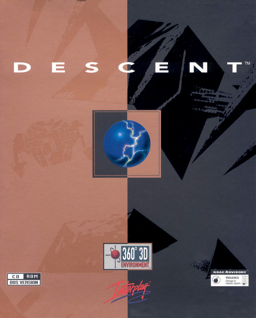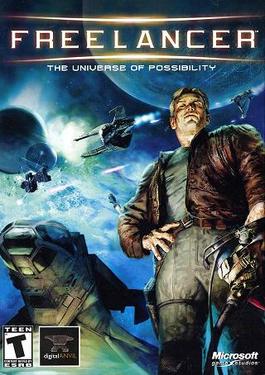
The 3DO Company, also known as 3DO, was an American video game company. It was founded in 1991 by Electronic Arts founder Trip Hawkins, in a partnership with seven other companies. After 3DO's flagship video game console, the 3DO Interactive Multiplayer, failed in the marketplace, the company exited the hardware business and became a third-party video game developer. It went bankrupt in 2003 due to poor sales of its games. Its headquarters were in Redwood City, California, in the San Francisco Bay Area.

The 3DO Interactive Multiplayer, also referred to as simply 3DO, is a home video game console developed by The 3DO Company. Conceived by entrepreneur and Electronic Arts founder Trip Hawkins, the 3DO was not a console manufactured by the company itself, but a set of specifications, originally designed by Dave Needle and Robert J. Mical of New Technologies Group, that could be licensed by third parties. Panasonic produced the first models in 1993, and further renditions of the hardware were released afterwards by GoldStar, Sanyo, Creative Labs, and Samsung Electronics in 1997.

Descent is a first-person shooter (FPS) game developed by Parallax Software and released by Interplay Productions in 1995 for MS-DOS, and later for Macintosh, PlayStation, and RISC OS. It popularized a subgenre of FPS games employing six degrees of freedom and was the first FPS to feature entirely true-3D graphics. The player is cast as a mercenary hired to eliminate the threat of a mysterious extraterrestrial computer virus infecting off-world mining robots. In a series of mines throughout the Solar System, the protagonist pilots a spaceship and must locate and destroy the mine's power reactor and escape before being caught in the mine's self-destruction, defeating opposing robots along the way. Players can play online and compete in either deathmatches or cooperate to take on the robots.
Heroes of Might and Magic, known as Might & Magic Heroes since 2011, is a series of video games originally created and developed by Jon Van Caneghem through New World Computing.
Trade Wars is a series of video games dating back to 1984. The video games are inspired by Hunt the Wumpus, the board game Risk, and the original space trader game Star Trader.

Freelancer is a space trading and combat simulation video game developed by Digital Anvil and published by Microsoft Game Studios. It is a chronological sequel to Digital Anvil's Starlancer, a combat flight simulator released in 2000. The game was initially announced by Chris Roberts in 1999, and following many production schedule mishaps and a buyout of Digital Anvil by Microsoft, it was eventually released in March 2003.

Meridian 59 is a 1996 video game developed by Archetype Interactive and published by The 3DO Company. It was the first 3D graphical massively multiplayer online role-playing game (MMORPG) and one of the longest running original online role-playing games. The development team included John Hanke, who later founded Niantic, Inc. and codeveloped Google Earth and Pokémon Go.

NetDevil Ltd. was an American developer of massively multiplayer online games, based in Louisville, Colorado and owned by Gazillion Entertainment.

Vega Strike is a first-person space trading and combat simulator, developed for Microsoft Windows, Linux, FreeBSD and OS X systems. Many of the core game mechanics of Vega Strike are indirectly inspired by Elite. Other games, such as Wing Commander: Privateer, influenced the original developer.

Heroes of Might and Magic II: The Succession Wars is a turn-based strategy video game developed by Jon Van Caneghem through New World Computing and published in 1996 by the 3DO Company. The game is the second instalment of the Heroes of Might and Magic series and is typically credited as the breakout game for the series. Heroes II was voted the sixth-best PC game of all time by PC Gamer in May 1997.

DarkSpace is a massively multiplayer real-time strategy computer game developed by PaleStar. Released in December 2001, DarkSpace involves multiplayer spaceship combat between three player-controlled factions.

Urban Assault is a 3D combined first-person shooter and real-time strategy computer game developed by the German company TerraTools and published by Microsoft in the year 1998.

Disruptor is a 1996 first-person shooter video game developed by Insomniac Games and published by Universal Interactive Studios and Interplay Productions for the PlayStation. It was the first game developed by Insomniac Games. The game released on November 30, 1996 in North America and in December of that year in Europe. It received positive reviews from critics, but was a commercial failure, selling well below the company’s expectations.
The history of massively multiplayer online games spans over thirty years and hundreds of massively multiplayer online games (MMOG) titles. The origin and influence on MMO games stems from MUDs, Dungeons & Dragons (D&D) and earlier social games.

Jumpgate Evolution, commonly abbreviated as JGE, is an unreleased massively multiplayer online game having been in development by NetDevil intended to be published by Codemasters. The game is a sequel to Jumpgate: The Reconstruction Initiative and features a new graphics engine, all new assets and more accessible game play.

X3: Terran Conflict is a space trading and combat simulator by German developer Egosoft, part of their X series of games. Described as a stand-alone game, based on X3: Reunion, it boasts new plot lines, features and assets. It was first released in October 2008 for the European market and Steam.

Shockwave Assault is a science fiction combat flight simulation video game developed by Advanced Technology Group and published by Electronic Arts for various home video game consoles and PCs. The player takes control of a futuristic fighter plane to defeat extraterrestrial ships and tripods.

FTL: Faster Than Light is a real-time strategy roguelike game created by indie developer Subset Games, which was released for Microsoft Windows, macOS and Linux in September 2012. In the game, the player controls the crew of a single spacecraft, holding critical information to be delivered to an allied fleet, while being pursued by a large rebel fleet. The player must guide the spacecraft through eight sectors, each with planetary systems and events procedurally generated in a roguelike fashion, while facing rebel and other hostile forces, recruiting new crew, and outfitting and upgrading their ship. Combat takes place in pausable real time, and if the ship is destroyed or all of its crew lost, the game ends, forcing the player to restart with a new ship.

Warframe is a free-to-play action role-playing third-person shooter multiplayer online game developed and published by Digital Extremes. First released for Windows personal computers in March 2013, it was later ported to PlayStation 4 in November 2013, Xbox One in September 2014, Nintendo Switch in November 2018, PlayStation 5 in November 2020, and Xbox Series X/S in April 2021. Support for cross-platform play was released in 2022. Cross-save, as well as ports to mobile devices, is planned for 2023. The game is in a perpetual open beta.














